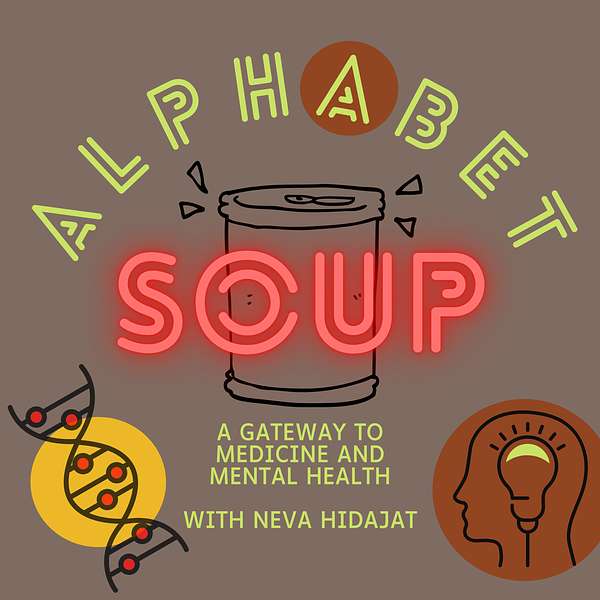
Alphabet Soup: A Mental Health & Medicine Podcast
Alphabet Soup: A Mental Health & Medicine Podcast
Ep. 21 Transactive Memory
We rely on a transactive memory network to remember information; or rather, where to find the information that we need to remember. Our tendency to transactive memory is changing the way our brains work! Daniel Wegner, the professor of psychology at Harvard who coined the term, also questions whether our memories are being negatively impacted... Find out more in the episode!
On this podcast, we’ve often talked about how humans depend on socializing. But how far does this inherent social tendency influence the capacity of our minds to do work? Turns out, according to the transactive memory theory, human memory is reliant and even improved when people remember things as a group. But now we live in a digital age and the internet is changing how our transactive memory works. We have the opportunity to rely not only on people, but also our smartphones and the internet to remember things. So how is this changing our brains? and is this necessarily a bad thing? Keep listening to find out.
The theory of transactive memory is a term coined by Daniel Wegner, who was an American social psychologist and a professor of psychology at Harvard University. Transactive memory refers to the method by which our brains compartmentalize information, and this method exists in many forms.
For example, one person in a relationship may be better at remembering relative’s birthdays, while the other is better at remembering relative’s phone numbers. Say that October 10th is their cousin’s birthday, the one who remembers birthdays will remind the other that they need to give their cousin a call, and the one who remembers phone numbers will dial in the digits and together they can wish their cousin a happy birthday. The ability to rely on another person to remember information is the basis of the transactive memory theory. Sure, a person could remember both their relative’s birthdays and their relative’s phone numbers but applying transactive memory has altered what one person needs to remember: to make a call, the person who remembers birthdays only needs to remember who knows phone numbers (in this situation it happens to be their partner.) and this applies vice versa.
However, transactive memory not only happens between individuals. For example, a person could rely on a phone book to remember their relative’s phone numbers. Similarly, on a cousin’s birthday, they do not need to recall their cousin’s number, they only need to remember that the information they are looking for is in the phone book. Pretty cool huh! Humans have developed so many ways to put transactive memory into function. One of the greatest developments is, you guessed it, the internet.
The internet stores a vast majority of information that, nowadays with smartphones and laptops etc., we have such easy access to. As you can imagine, the opportunities for transactive memory to replace actual recall are abundant. Want to know which actor plays Captain America? Or what the capital of Sweden is? Type it into google. With a biology test on the way, a student can easily run a quick google search to refresh their memory on the types of metabolic processes a plant cell can carry out. What’s more, is that the student can rely on a reminder from their phone calendar to study for the upcoming bio test in two days. What’s happened here is that the student didn’t necessarily have to remember what day their bio test is, because they’ve already programmed the date into their phone and feel secure that their phone will do its part by reminding them to study as the test day approaches. The internet has become a vital player in our transactive memory source, the partner you can always rely on.
Professor Wegner conducted a study that further demonstrates the effects of transactive memory in the digital age. In the experiment, a group of participants were asked to type statements like “An ostrich’s eye is bigger than its brain.” However, half of them were told that their work would be saved, while the other were told that their work would be erased. Of the two groups, the group that was told their work would be erased were more successful at recalling the sentence that they typed. Could this be because they knew that they could not rely on transactive memory and therefore put more effort into actually remembering the statement?
You see, transactive memory in the digital age is changing how our memories work. Our brains have evolved the ability to store more of where we can access certain information rather than the information itself.
The question is, is this alteration of what we remember necessarily a bad thing? Wegner himself concedes that whether dependence on the internet will negatively impact our memory requires further research.
In the meantime, it is time for today’s bit. George Shaw says that “Progress is impossible without change.” So, let’s keep an optimistic mindset that our reliance on transactive memory will prove to be a positive evolutionary extension of our minds that allow our brains to have the capacity to do more of other things.
Finally, I will do the honor of being your transactive memory source by reminding you to share the show with your friends and family! Hey, thanks for listening to today’s episode of Alphabet Soup and I’ll see you next week.